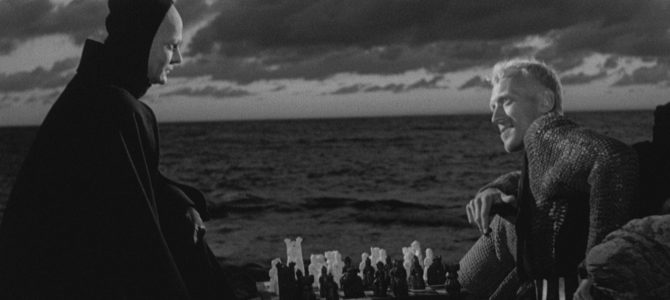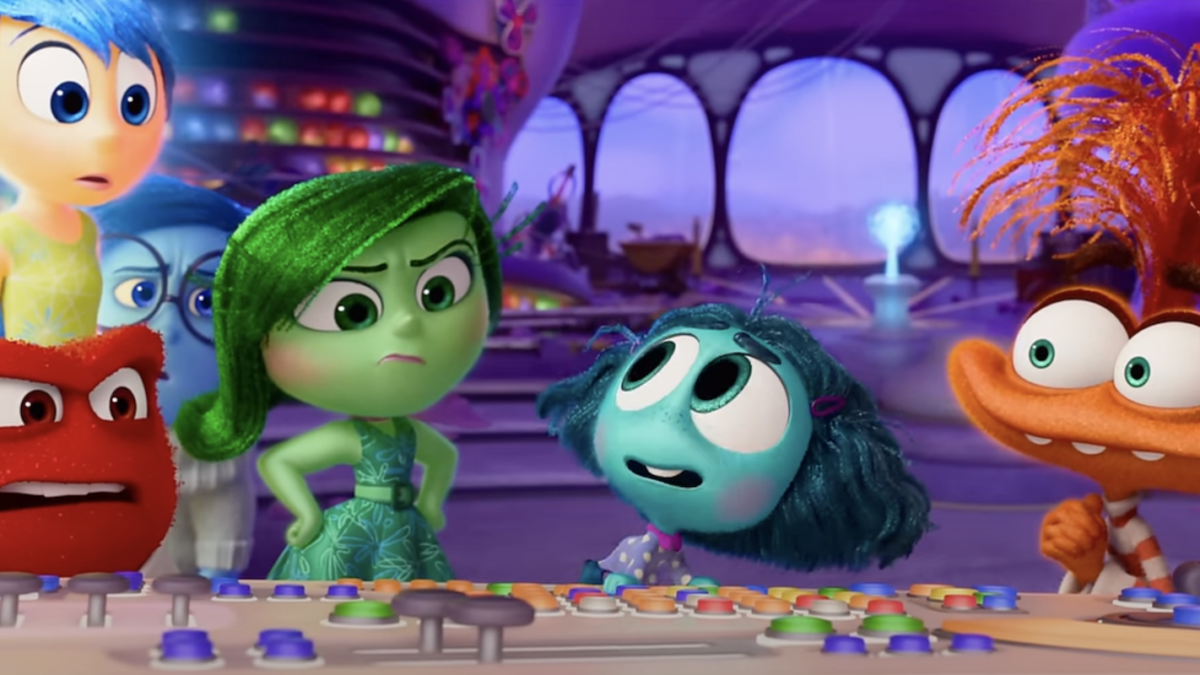
Swedish filmmaker Ingmar Bergman produced “The Seventh Seal” in 1957. As with all great works of art, it still speaks as clearly to us today as it ever did to folk in its own time and place. The movie is a profound meditation on man, God, and the relationship between them. Looking at the film through existential philosophy can help draw out its main implications about the meaning of being human.
First, a short synopsis of the plot. The main character of the film is a Knight who is returning home, disillusioned and exhausted, from the Crusades. While he is resting on a beach, he runs into the figure of Death—a man dressed in a black, monkish cowl. When Death asks the Knight if he’s afraid, the Knight responds: “My body is afraid, but I am not.” Then he challenges Death to a game of chess.
The rest of the film is just about the Knight encountering different people and trying to find some meaning with what time he has left as he continues to play for his life (with the rule that he can keep living as long the game is in progress).
The first scene itself is enough for you to see that there’s something strange about this guy. When the average person runs into Death, he would probably lose his mind with fear. But this Knight stays perfectly calm, and greets Death as an old friend. So, what’s going on?
There Are Two Kinds of People
The philosopher Søren Kierkegaard, who’s often thought of as the father of existentialism, can help bring some insight to this situation. Kierkegaard’s main motto is that “subjectivity is truth.” He’s not looking for objective, scientific knowledge, but starts with the individual human soul, and that soul’s first-person experience of the world.
This point becomes clear in Kierkegaard’s view on the question of immortality. In his major work, “Concluding Unscientific Postscript,” he says:
The very moment I am conscious of my immortality, I am completely subjective, and I cannot become immortal in partnership in rotation with two other single gentlemen. Subscription collectors who produce long subscription lists of men and women who feel a need in general to become immortal receive no benefit for their trouble, because immortality is a good that cannot be obtained by bullying one’s way with a long list of signatures.
As it is with immortality, so it is with God. In a way, there’s no question of whether you “believe” in him or not. You either know that God is real or you don’t, in the same way that you sense your own immortality or you don’t. It’s kind of like being in love, as well: if you need to ask ten of your friends if you’re “really” in love, then the odds are, you’re not. Scientific confirmation from a multitude of other gentlemen (as Kierkegaard might put it) isn’t going to help. Either your soul knows or it doesn’t, and that’s all there is to it.
Kierkegaard would call the first kind of person the aesthetic type, and the second the ethical-religious type. The aesthetic type thinks any talk of immortality is just silly, since that kind of person can’t see anything other than the surface of the world as it appears to his senses. The ethical-religious type, though, has deeper intuitions in his soul. Maybe the Knight can look Death square in the eyes because he is this type of man.
A Brawl at the Tavern
The Knight starts off in despair. He confesses: “I live now in a world of phantoms, a prisoner of my own dreams.” He also yells at God for making himself so difficult to understand and be sure of. According to Kierkegaard, though, most people are in a state of despair—in fact, they’re so far in that they don’t even realize they’re in despair. The Knight’s self-awareness of despair thus becomes a key step toward his redemption. The Knight spends the rest of the film overcoming this curse, trying to do a good deed and treating others with unpretentious kindness.
If you want to see why this makes the Knight special, consider a scene in the film of a brawl at some tavern. It reveals the way the average, aesthetic (as opposed to ethical-religious) person tends to conduct himself. As Death himself says: “Most people give no thought to death and nothingness.”
At the tavern, the whole crowd picks on a Jester—a socially awkward dreamer with a kind heart. They act with collective, wanton cruelty and self-abandon (led by a morally bankrupt theologian, no less). Of course, they think nothing of this: they neither know nor care about whether they even have souls, let alone what their actions will do to their souls.
The Knight, on the other hand, befriends the Jester. By the end of the film, the Knight is able to say the following words to the Jester’s wife, after her family treats him to a picnic: “I will remember this moment: the stillness, the dusk, these wild strawberries, this bowl of milk. Your faces in the evening light. I’ll hold this memory between my hands like a bowl of fresh milk full to the brim. Mikael asleep, Jof with his lyre. I’ll try to remember what we spoke of. And it will be a sign, for me—a source of great satisfaction.”
Afterwards, he laughs in the face of Death. That’s his redemption, his reward, for being an ethical-religious man.
Time to Forget Descartes
Ever since the Enlightenment, the meaning of the word “God” has become fuzzy. René Descartes is a key culprit. He developed a philosophy of reason in which God turned into nothing more than some vague and abstract idea—a premise that was needed to fix the argument, but without having any inherent value; a figure for purely logical thought.
Descartes did try to anchor his argument on the idea that this world must be real and meaningful, as opposed to some monstrous deception, because God is good. But this is weak, weak stuff. (In his defense, at least he lived long before movies such as “The Matrix” or “The Truman Show.”) In Descartes’ philosophy, God is just a placeholder; he might as well not exist. It makes sense, then, that many later rationalists just dropped God altogether.
This is very different from the proclamation of the Gospel, which insists the Lord is a specific, actual person: not some pie-in-the-sky abstraction, but a truly living presence. Not a figure for logical thought, but a relationship for the passionate heart. This can be called the existential, as opposed to rationalistic, conception of God. It can also be called the idea of the true God, if you believe in the Gospel; and this idea underlies the worldview of “The Seventh Seal.”
The Problem with This Generation
Kierkegaard’s motto that subjectivity is truth has been all but lost. A lot of people, especially millennials, have an actual belief system where they refuse to trust anything but their physical senses, or what can be verified with the scientific method. But God and immortality and love have nothing to do with the scientific method; you can’t ask ten gentlemen to verify them for you.
That’s because these are not “objective” things. These are things you can only see for yourself, on the basis of individual, subjective courage. If we start with the premise that our souls’ intuitions are nothing but delusions, there’s no hope of getting anywhere.
When you face Death, a vague idea isn’t going to save you. Nor is the agnostic weakness of saying you just don’t know. What’s really needed is a living presence within the heart—something that your soul knows to be at least as real as anything else in this world.
The Knight had that, and it’s why he could carry himself the way he did. It’s like the presence of Death outside of him was outweighed by the presence of Life within him. It’s Kierkegaard’s existentialism, and not Descartes’s rationalism, that we’ll all need in the end, if we want any real answers to the mortal problem of meaning. That’s at least one thing to learn from Bergman’s film.









